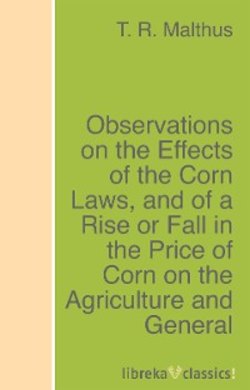Читать книгу Observations on the Effects of the Corn Laws, and of a Rise or Fall in the Price of Corn on the Agriculture and General Wealth of the Country - T. R. Malthus - Страница 3
ОглавлениеObservations on the Effects of the Corn Laws,
and of a Rise or Fall in the Price of Corn on the Agriculture
and General Wealth of the Country
by the Rev. T.R. Malthus,
Professor of Political Economy at the East India College, Hertfordshire.
London: Printed for J. Johnson and Co., St. Paul's Church-Yard.
1814.
Observations, &c. &c.
A revision of the corn laws, it is understood, is immediately to come under the consideration of the legislature. That the decision on such a subject, should be founded on a correct and enlightened view of the whole question, will be allowed to be of the utmost importance, both with regard to the stability of the measures to be adopted, and the effects to be expected from them.
For an attempt to contribute to the stock of information necessary to form such a decision, no apology can be necessary. It may seem indeed probable, that but little further light can be thrown on a subject, which, owing to the system adopted in this country, has been so frequently the topic of discussion; but, after the best consideration which I have been able to give it, I own, it appears to me, that some important considerations have been neglected on both sides of the question, and that the effects of the corn laws, and of a rise or fall in the price of corn, on the agriculture and general wealth of the state, have not yet been fully laid before the public.
If this be true, I cannot help attributing it in some degree to the very peculiar argument brought forward by Dr Smith, in his discussion of the bounty upon the exportation of corn. Those who are conversant with the Wealth of nations, will be aware, that its great author has, on this occasion, left entirely in the background the broad, grand, and almost unanswerable arguments, which the general principles of political economy furnish in abundance against all systems of bounties and restrictions, and has only brought forwards, in a prominent manner, one which, it is intended, should apply to corn alone. It is not surprising that so high an authority should have had the effect of attracting the attention of the advocates of each side of the question, in an especial manner, to this particular argument. Those who have maintained the same cause with Dr Smith, have treated it nearly in the same way; and, though they may have alluded to the other more general and legitimate arguments against bounties and restrictions, have almost universally seemed to place their chief reliance on the appropriate and particular argument relating to the nature of corn.
On the other hand, those who have taken the opposite side of the question, if they have imagined that they had combated this particular argument with success, have been too apt to consider the point as determined, without much reference to the more weighty and important arguments, which remained behind.
Among the latter description of persons I must rank myself. I have always thought, and still think, that this peculiar argument of Dr Smith, is fundamentally erroneous, and that it cannot be maintained without violating the great principles of supply and demand, and contradicting the general spirit and scope of the reasonings, which pervade the Wealth of nations.
But I am most ready to confess, that, on a former occasion, when I considered the corn laws, my attention was too much engrossed by this one peculiar view of the subject, to give the other arguments, which belong to it, their due weight.
I am anxious to correct an error, of which I feel conscious. It is not however my intention, on the present occasion, to express an opinion on the general question. I shall only endeavour to state, with the strictest impartiality, what appear to me to be the advantages and disadvantages of each system, in the actual circumstances of our present situation, and what are the specific consequences, which may be expected to result from the adoption of either. My main object is to assist in affording the materials for a just and enlightened decision; and, whatever that decision may be, to prevent disappointment, in the event of the effects of the measure not being such as were previously contemplated. Nothing would tend so powerfully to bring the general principles of political economy into disrepute, and to prevent their spreading, as their being supported upon any occasion by reasoning, which constant and unequivocal experience should afterwards prove to be fallacious.
We must begin, therefore, by an inquiry into the truth of Dr Smith's argument, as we cannot with propriety proceed to the main question, till this preliminary point is settled.
The substance of his argument is, that corn is of so peculiar a nature, that its real price cannot be raised by an increase of its money price; and that, as it is clearly an increase of real price alone which can encourage its production, the rise of money price, occasioned by a bounty, can have no such effect.
It is by no means intended to deny the powerful influence of the price of corn upon the price of labour, on an average of a considerable number of years; but that this influence is not such as to prevent the movement of capital to, or from the land, which is the precise point in question, will be made sufficiently evident by a short inquiry into the manner in which labour is paid and brought into the market, and by a consideration of the consequences to which the assumption of Dr Smith's proposition would inevitably lead.
